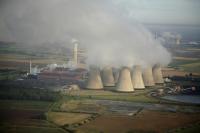In a 2006 year-end interview with the Victoria Times-Colonist, British Columbia’s Premier Gordon Campbell said the province should be a leader on climate change and a forthcoming update of his government’s energy plan will “deal directly” with the issue.
His comments were welcome, coming at a time of rapid climate change, global warming and melting Arctic ice shelves. Last week’s poll by the Sierra Legal Defense Fund suggests four out of five British Columbians want mandatory targets for reducing greenhouse gases. An earlier Decima poll (pdf file), moreover, found the environment on par with – if not ahead of – the economy as a national issue.
The issue has flared anew in the public eye with California governor Arnold Schwarzenegger’s call for a 10 per cent cut in carbon emissions by 2020. There is even talk federal limits eventually will be placed on carbon dioxide emissions in the US, despite the Bush administration’s adamant opposition to any limits on fossil fuel emissions.
But Campbell’s remarks were difficult to reconcile with BC Hydro’s recent decision to purchase electricity produced from coal at two new plants by 2010. The decision, moreover, flew in the face of a 2005 poll commissioned by BC Hydro that found 74 per cent of British Columbians oppose coal-fired electricity.
The province’s current energy plan was adopted in 2002, when the Campbell government committed B.C. Hydro to buying new power from private sources. The update, which began in 2005, wasn’t originally expected to include any dramatic changes.
But as views solidified over climate change in 2006, rumours began to circulate that the energy plan update might include caps on greenhouse gas emissions.
The plan is currently remains in draft form, but was originally scheduled for release in 2006. Then it was postponed to mid-January. So far, no date has been set for its release.
The province already requires more than 50 per cent of new electricity capacity to be clean – meaning little or no greenhouse-gas emissions. But it has no policy that caps total emissions, so there is nothing to prevent the other 50 per cent from being allotted to conventional coal plants, the most greenhouse-gas intensive economic activity on the planet.
Mark Jaccard , professor of resource and environmental management at Simon Fraser University, believes there are three ways to reduce greenhouse emissions: use less energy; switch from fossil fuels to renewable sources like wind, hydro, biomass and possibly nuclear; or retain fossil fuels for some uses like electricity generation while capturing the resulting carbon dioxide so it never reaches the atmosphere.
Jaccard, author of Sustainable Fossil Fuels, the 2006 winner of Canada’s coveted Donner Prize, says a coal-fired electricity plant with carbon capture and storage would produce only 10 per cent of the carbon emissions of a conventional plant.
“If all current and future coal plants in the world were required to adopt this technology in initial construction or during retrofit, humanity would at least have a chance of achieving the global emissions reductions that scientists say are essential,” Jaccard said.
Subscribe to our newsletter
Stay up to date with DeSmog news and alerts






